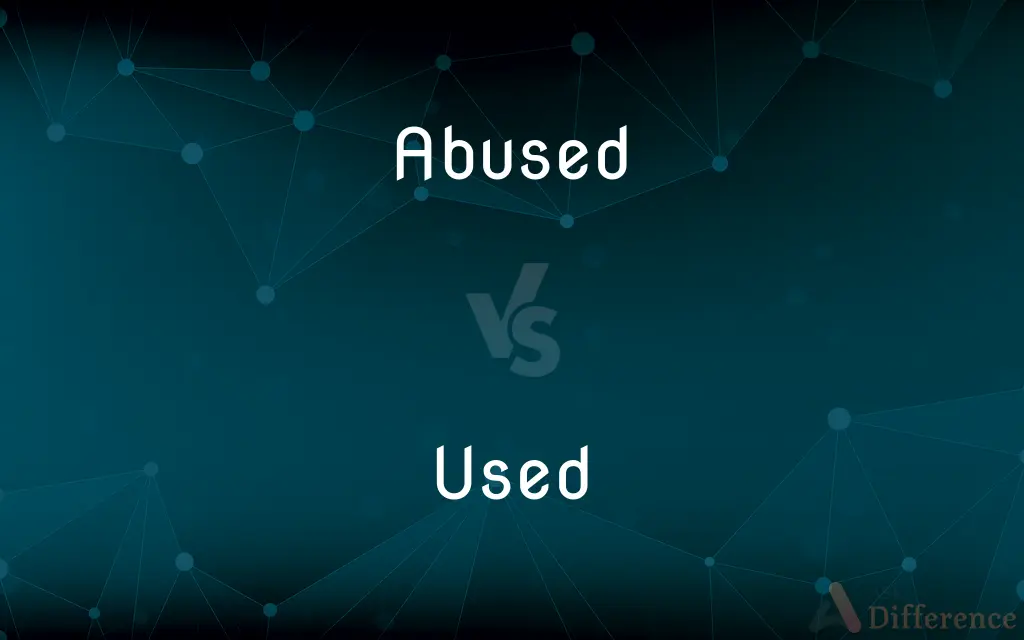Abused vs. Used — What's the Difference?
By Tayyaba Rehman — Updated on September 26, 2023
"Abused" refers to being misused or treated harmfully or violently, while "used" simply implies being utilized or employed for a purpose.

Difference Between Abused and Used
Table of Contents
ADVERTISEMENT
Key Differences
The words “abused” and “used” signify different treatments of people or things. “Abused” primarily denotes a severe level of mistreatment or improper use, implying harmful, unethical, or violent treatment. It could relate to people, substances, or objects that are misused to an extent that can lead to harm or damage. Conversely, “used” is a neutral term that denotes the act of employing or utilizing something or someone for a purpose. It does not inherently convey any harmful or negative treatment and is applicable to a wide range of contexts.
Understanding the distinct meanings of “abused” and “used” is crucial for accurate communication. The term “abused” conveys a sense of harm, violation, or improper treatment, making it suitable for contexts where the severity and negativity of the action need emphasis. On the other hand, “used” is versatile and can be applied wherever the act of utilizing or employing is discussed, without carrying any inherent negativity or implication of mistreatment. Misinterpreting or interchangeably using these terms can lead to serious misunderstandings and miscommunications.
In societal and interpersonal contexts, recognizing the difference between “abused” and “used” is crucial. Using “abused” denotes a severe, harmful treatment of individuals, implying a grave situation that requires attention and intervention. It emphasizes the unethical, harmful nature of actions or behaviors towards people or things. In contrast, “used” in interpersonal contexts could simply mean being utilized or employed, without any negative implications, thus indicating a more neutral interaction or relationship between entities.
In legal and ethical discussions, precision in using “abused” and “used” is vital. The word “abused” is apt for describing violations, harmful treatments, and exploitations, serving to highlight the seriousness of the offense or situation. Meanwhile, “used” can refer to the legitimate, neutral utilization of resources, rights, or individuals, not implying any harm or wrongdoing. Employing the right term in such discussions is paramount to maintain clarity and to ensure that the severity or neutrality of situations is conveyed accurately.
Comparison Chart
Connotation
Implies mistreatment or harmful, unethical, or violent treatment
Implies being utilized or employed for a purpose
ADVERTISEMENT
Application
Applies to severe, negative actions or treatments
Neutral term, applicable to a wide range of contexts
Implication in Interpersonal Context
Denotes severe, harmful treatment requiring intervention
Indicates a neutral interaction or relationship
Use in Legal Discussions
Used to describe violations, harmful treatments, and exploitations
Refers to the legitimate, neutral utilization
Inherent Negativity
Carries inherent negativity and emphasis on harm
Does not convey any inherent negativity or harm
Compare with Definitions
Abused
Indicates severe, negative actions or treatments.
The abused individual found refuge in a support group.
Used
Accustomed or adapted to.
He was used to the noise of the city.
Abused
Denotes exploitation or violation.
The rights of the citizens were abused by the authoritarian regime.
Used
Having been put into service.
The used book store had a vast collection.
Abused
Misused to an extent causing harm or damage.
Abused substances can lead to severe health issues.
Used
Experienced or subjected to.
She felt used after dedicating so much time to the project.
Abused
Utilized improperly or unethically.
The abused power led to public outcry and protests.
Used
Having been consumed or depleted.
All the used resources were properly recycled.
Abused
Treated with cruelty or violence.
The abused animal was rescued by a local shelter.
Used
Being utilized or employed for a purpose.
The used car was in excellent condition.
Abused
To use improperly or excessively; misuse
Abuse alcohol.
Abuse a privilege.
Used
Not new; secondhand
A used car.
Abused
To hurt or injure by maltreatment; ill-use
Animals that were abused by a negligent owner.
Used
(also yst) Accustomed; habituated
Getting used to the cold weather.
Was used to driving a small car.
Abused
To force sexual activity on; rape or molest.
Used
Simple past tense and past participle of use
You used me!
Abused
To assail with insulting or hurtful words; revile.
Used
To perform habitually; to be accustomed [to doing something].
He used to live here, but moved away last year.
The club used to be frequented by locals; then, after the "incident", it used to get raided by the cops.
Abused
(Obsolete) To deceive or trick.
Used
That is or has or have been used.
The ground was littered with used syringes left behind by drug abusers.
Abused
Improper or excessive use; misuse
Abuse of authority.
Drug abuse.
Used
That has or have previously been owned by someone else.
He bought a used car.
Abused
Rough treatment or use
Shoes that have taken a lot of abuse.
Used
Familiar through use; usual; accustomed.
I got used to this weather.
Abused
Physical maltreatment or violence
Spousal abuse.
Used
Employed in accomplishing something;
The principle of surprise is the most used and misused of all the principles of war
Abused
Sexual abuse.
Used
Of persons; taken advantage of;
After going out of his way to help his friend get the job he felt not appreciated but used
Abused
Insulting or hurtful language, especially when used to threaten or demoralize
Subjected her subordinates to verbal abuse.
Used
Previously used or owned by another;
Bought a secondhand (or used) car
Abused
An unjust or wrongful practice
A government that commits abuses against its citizens.
Abused
Simple past tense and past participle of abuse
Abused
Having been a victim of some form of abuse, most commonly child abuse or domestic violence.
Abused
Overused; used profligately or in excess.
Abused
(obsolete) Deluded, deceived.
Abused
Used improperly or excessively especially drugs;
An abused substance
Abused
Abused with language
Abused
Physically abused;
An abused wife
Common Curiosities
Is “abused” suitable for contexts where severity needs emphasis?
Yes, “abused” is suitable for contexts where the severity and negativity of the action need emphasis due to its implication of harm and mistreatment.
Can “used” imply harm or mistreatment?
Typically, “used” does not imply harm or mistreatment and is a neutral term denoting utilization or employment.
Can “abused” relate to substances and objects as well?
Yes, “abused” can relate to substances or objects that are misused to an extent that can lead to harm or damage.
Does “abused” imply exploitation or violation in legal discussions?
Yes, in legal discussions, “abused” implies exploitation, violations, and harmful treatments, highlighting the seriousness of the offense.
Is “used” versatile in its application?
Yes, “used” is a versatile term applicable wherever the act of utilizing or employing is discussed, without inherent negativity.
Is “used” inherently neutral in its connotation?
Yes, “used” is inherently neutral, not conveying any negativity or implication of harm or mistreatment.
Can “used” be applied to a wide range of contexts?
Yes, “used” is a neutral and versatile term that can be applied to a wide range of contexts to denote utilization or employment.
What does “abused” primarily imply?
“Abused” primarily implies severe mistreatment, harmful, unethical, or violent treatment of individuals or things.
What does the term “used” mean?
The term “used” simply denotes the act of utilizing or employing something or someone for a purpose.
Does “abused” always convey a sense of harm or violation?
Yes, “abused” always conveys a sense of harm, violation, or severe improper treatment.
Does “abused” emphasize the unethical and harmful nature of actions or behaviors?
Yes, “abused” emphasizes the unethical, harmful nature of actions or behaviors towards people or things.
Is “abused” suitable for describing severe, harmful treatments in interpersonal contexts?
Yes, “abused” is suitable for describing severe, harmful treatments in interpersonal contexts, implying grave situations requiring intervention.
Can “used” refer to the legitimate utilization of resources?
Yes, “used” can refer to the legitimate, neutral utilization of resources without implying any harm or wrongdoing.
Is precision important when using “abused” and “used” in legal and ethical discussions?
Yes, precision is vital in legal and ethical discussions to convey the severity or neutrality of situations accurately using “abused” and “used.”
Can “abused” denote exploitation or violation?
Yes, “abused” denotes exploitation, violation, and severe negative actions or treatments.
Share Your Discovery

Previous Comparison
Flash vs. Meat
Next Comparison
Return vs. BackAuthor Spotlight
Written by
Tayyaba RehmanTayyaba Rehman is a distinguished writer, currently serving as a primary contributor to askdifference.com. As a researcher in semantics and etymology, Tayyaba's passion for the complexity of languages and their distinctions has found a perfect home on the platform. Tayyaba delves into the intricacies of language, distinguishing between commonly confused words and phrases, thereby providing clarity for readers worldwide.
















































